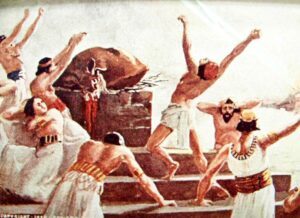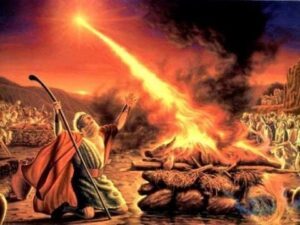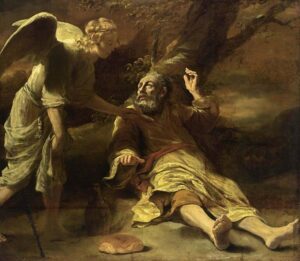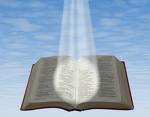Elijah Fed by an Angel
Let me tell you something. When you asked God for wisdom, and He handed you a big black book over 1000 pages long. What did you do? Did you say it was too hard, and give up? Or did you look for someone to read it for you, and give you the quick run down on what it says? We are in the end of a spiritual war. Don’t you think it’s time to read the manual? The best thing you can do is pick up the book, read it, and if you need help, find someone who is able to explain how to understand scripture.
1 Kings 19:5-8 KJV And as he lay and slept under a juniper tree, behold, then an angel touched him, and said unto him, Arise and eat. (6) And he looked, and, behold, there was a cake baken on the coals, and a cruse of water at his head. And he did eat and drink, and laid him down again. (7) And the angel of the LORD came again the second time, and touched him, and said, Arise and eat; because the journey is too great for thee. (8) And he arose, and did eat and drink, and went in the strength of that meat forty days and forty nights unto Horeb the mount of God.
In this acted parable Elijah finds himself asleep under a juniper tree. He had just been through the highest and lowest day of his life. Elijah was sent by God to challenge the prophets of Baal. In this scene he was out numbered four hundred and fifty to one. As the nation of Israel looked on, the prophets of Baal called out to their god to send down fire from the early morning until the time of the evening sacrifice. Dressed in their priestly attire, Baal’s prophets made a spectacle of themselves jumping, shouting, dancing, chanting, and cutting themselves until they were covered in blood. Elijah sat back and observed with so much confidence in the Lord, he went as far as mocking Baal and his prophets. He asked them if their god was too far away to hear, or possibly sleeping.
As time drew close for the evening sacrifice, Elijah began assembling a broken altar dedicated to God. The mass of bloodied and worn out prophets stood by watching as Elijah surveyed the area. He walked around the area, waiting to hear the still small voice of God he had come to recognize. Twelve large stones were scattered about. As Baal’s prophets observed Elijah’s every move, the sons of Israel also lingered close to the scene. No one stepped forward to offer aid to Elijah. After circling the area a number of times, Elijah chose one stone, setting it in place. He carefully choose the next stone, placing it next to the first one. Everyone stood in silence as Elijah finished the foundation. Now Elijah had to lift the next set of stones to place them upon the first.
 Baal’s prophets mumbled amongst themselves, wagering on Elijah’s ability to lift the heavy stones. The setting sun cast shadows on Elijah’s arms highlighting every muscle as they strained against the massive weight of the first stone. The sons of Israel drew closer to witness the display of super human strength. A spark of confidence began to flow through the spectators. At the same time a fire began to burn in Elijah’s heart to match the fire he felt in his body as it strained against the weight. This feat was repeated until all twelve stones were in place.
Baal’s prophets mumbled amongst themselves, wagering on Elijah’s ability to lift the heavy stones. The setting sun cast shadows on Elijah’s arms highlighting every muscle as they strained against the massive weight of the first stone. The sons of Israel drew closer to witness the display of super human strength. A spark of confidence began to flow through the spectators. At the same time a fire began to burn in Elijah’s heart to match the fire he felt in his body as it strained against the weight. This feat was repeated until all twelve stones were in place.
 After the altar was repaired, Elijah began digging a trench around it. This perplexed Israel, and brought out a number of comments from Baal’s prophets. Once the trench was completed, Elijah arranged the wood upon the altar, cut the ox into pieces and arranged in on the wood. Elijah then called for a large amount of water to be poured over the ox, wood, and altar, not once, but three times. With doubts and criticism at an all time high, “Elijah the prophet came near and said, Jehovah, the God of Abraham, Isaac, and of Israel, let it be known this day that You are God in Israel, and that I am Your servant, and that I have done all these things at Your Word. Hear me, O Jehovah, hear me, that this people may know that You are Jehovah God, and that You have turned their heart back again. And the fire of Jehovah fell and burned up the burnt sacrifice and the wood, and the stones and the dust, and licked up the water that was in the trench.” 1 Kings 18:36-38.
After the altar was repaired, Elijah began digging a trench around it. This perplexed Israel, and brought out a number of comments from Baal’s prophets. Once the trench was completed, Elijah arranged the wood upon the altar, cut the ox into pieces and arranged in on the wood. Elijah then called for a large amount of water to be poured over the ox, wood, and altar, not once, but three times. With doubts and criticism at an all time high, “Elijah the prophet came near and said, Jehovah, the God of Abraham, Isaac, and of Israel, let it be known this day that You are God in Israel, and that I am Your servant, and that I have done all these things at Your Word. Hear me, O Jehovah, hear me, that this people may know that You are Jehovah God, and that You have turned their heart back again. And the fire of Jehovah fell and burned up the burnt sacrifice and the wood, and the stones and the dust, and licked up the water that was in the trench.” 1 Kings 18:36-38.
Taking command of the situation Elijah ordered the sons of Israel to take all of Baal’s prophets and slay them at the creek Kishon. After that, Elijah prayed to God to end the drought. God answered Elijah’s prayers and sent signs of fire and rain. This should have been adequate to fill anyone’s faith to overflowing, but one little thing took all of Elijah’s faith and shook it. Threats from one little woman, Jezebel shook all the faith out of Elijah’s heart. In sorrow Elijah went into the wilderness to face his problems by himself. The power of one evil woman can shake the strongest, most confident follower of God.
 This is when God sent His angel to touch and speak to Elijah, not once but twice. Was Elijah in a spiritual sleep when the angel touched him? Does this spiritual sleep represent a state in which God’s followers are not listening, or a condition of rest and meditation when His people are prepared to hear His voice? Was the cake and water a form of spiritual food and refreshment prepared and sent from God? Was Elijah exhibiting faith in God when he left on a journey without preparing for it? The angel fed Elijah a second time and told him the journey ahead was too great for him. Was this a physical or a spiritual journey? The food lasted Elijah for forty days and forty nights. Does this have any relationship with other texts with the same time period? Why did God lead Elijah to mount Horeb?
This is when God sent His angel to touch and speak to Elijah, not once but twice. Was Elijah in a spiritual sleep when the angel touched him? Does this spiritual sleep represent a state in which God’s followers are not listening, or a condition of rest and meditation when His people are prepared to hear His voice? Was the cake and water a form of spiritual food and refreshment prepared and sent from God? Was Elijah exhibiting faith in God when he left on a journey without preparing for it? The angel fed Elijah a second time and told him the journey ahead was too great for him. Was this a physical or a spiritual journey? The food lasted Elijah for forty days and forty nights. Does this have any relationship with other texts with the same time period? Why did God lead Elijah to mount Horeb?
To find the answers to these questions, each word will have to be compared with other texts in the Bible to learn the spiritual interpretations.
Slept
Matthew 13:25 KJV But while men slept, his enemy came and sowed tares among the wheat, and went his way.
This is one of the most critically studied parables in the Bible. Jesus tells about an enemy, Satan, who plants weeds among the wheat. This happened while the men slept. Jesus is talking about a spiritual sleep in which His followers were not diligently watching. If we are not in constant study and prayer, Satan can sneak up and plant weeds in our lives, causing all kinds of problems.
Matthew 25:5 KJV While the bridegroom tarried, they all slumbered and slept.
In this parable Jesus uses the symbol of a bridegroom to represent Himself. He knows His followers will be watching and waiting for a time, but as His return draws near, many will enter into a spiritual sleep. They will not be looking for the signs and wonders He will reveal through His word as His return approaches.
Psalms 3:4-6 MKJV I cried to Jehovah with my voice, and He heard me out of His holy hill. Selah. (5) I laid down and slept. I awoke, for Jehovah kept me. (6) I am not afraid of ten thousands of people who have set against me all around.
Through His prophet David, God assures us, He will hear our voices. God will watch over us even when we enter into a spiritual sleep. In this case, sleep was used to prepare David for the task ahead. God never gives up on His people, but uses different methods to attract our attention. It may be a blessing, or a trial. No matter what the odds, living in God’s perfect love will cast out all fear.
Sleep may a spiritual state in which the mind is not properly focused on God to see the signs he is providing, or it may be a state of preparation for an event that is about to happen. Elijah’s sleep may have been necessary for the forty days and nights of travel he was about to embark on.
Cake
Exodus 12:39 KJV And they baked unleavened cakes of the dough which they brought forth out of Egypt, for it was not leavened; because they were thrust out of Egypt, and could not tarry, neither had they prepared for themselves any victual.
Exodus 29:2 KJV And unleavened bread, and cakes unleavened tempered with oil, and wafers unleavened anointed with oil: of wheaten flour shalt thou make them.
Unleavened cakes were used on two occasions, the Passover feast, symbolizing freedom from bondage, both the physical illustrated by Egypt, and the spiritual, representing this sinful world. Unleavened cakes were also prepared as an offering to God in the Tabernacle service. Leaven is another word for yeast, a bacteria used to make bread. Other verses will reveal the spiritual meaning of leaven.
Leaven
1 Corinthians 5:7-8 KJV (7) Purge out therefore the old leaven, that ye may be a new lump, as ye are unleavened. For even Christ our passover is sacrificed for us: (8) Therefore let us keep the feast, not with old leaven, neither with the leaven of malice and wickedness; but with the unleavened bread of sincerity and truth.
Matthew 16:12 KJV Then understood they how that he bade them not beware of the leaven of bread, but of the doctrine of the Pharisees and of the Sadducees.
The Passover was also a prophecy of Christ’s perfect sacrifice. Unleavened bread eaten before the Passover represented the absence of sin. Leavened bread represents malice and wickedness while unleavened bread represents truth and sincerity, being truthful to your word and promises. Bread represents Jesus. “And Jesus said to them, I am the bread of life. He who comes to Me shall never hunger, and he who believes on Me shall never thirst.” (John 6:35 MKJV). Leaven also represents doctrine, a person’s principle beliefs. The Bible defines two major doctrines, man’s and God’s.
Doctrine
Matthew 15:9 MKJV But in vain they worship Me, teaching for doctrines the commandments of men.”
Romans 16:17-18 MKJV And I exhort you, brothers, to watch those making divisions and offenses contrary to the doctrine which you have learned, and avoid them. (18) For they who are such do not serve our Lord Jesus Christ, but their own belly; and by good words and fair speeches they deceive the hearts of the simple.
Men’s doctrines, or beliefs do not represent God, nor are they a substitute for worshipping God. They cause divisions and should be avoided. Manmade doctrines are created to serve the people inventing and enforcing them. Manmade doctrines also distract from the true worship of God.
Isaiah 28:9-10 KJV Whom shall he teach knowledge? and whom shall he make to understand doctrine? them that are weaned from the milk, and drawn from the breasts. (10) For precept must be upon precept, precept upon precept; line upon line, line upon line; here a little, and there a little:
Why did Isaiah ask two questions, “whom shall He teach knowledge, and whom shall He make to understand doctrine?” The questions are phrased as if God is asking if anyone is willing to listen to Him. This refers to the same frame of mind as a spiritual sleep. There is an answer, someone will eventually listen. God would not have asked the question if the answer was, no one. The answer is provided in the same texts. Weaned from the milk, and drawn, or taken away from the breasts refers to a physical and spiritual growth. A baby is totally dependent on the mother for food. Immature Christians are totally dependent on others to spiritually feed them. The real knowledge and understanding God offers is not taught through other people, it is a personal learning experience. The Bible goes on to explain the exact process to follow. Precept upon precept, line upon line refers to comparing scripture with scripture. The Bible is fully capable of explaining itself through the guidance of the Holy Spirit. Howbeit when he, the Spirit of truth, is come, he will guide you into all truth: for he shall not speak of himself; but whatsoever he shall hear, that shall he speak: and he will shew you things to come. (John 16:13 KJV)
2 Timothy 3:16-17 MKJV All Scripture is God-breathed, and is profitable for doctrine, for reproof, for correction, for instruction in righteousness, (17) that the man of God may be perfected, thoroughly furnished to every good work.
 The entire Bible is from God. Doctrine should not come from any other source. The Bible should be used to prove and correct every source of doctrine. Any and all misleading doctrine will lead away from the perfected state God intended. Only the pure word of God will properly furnish God’s people for the work ahead.
The entire Bible is from God. Doctrine should not come from any other source. The Bible should be used to prove and correct every source of doctrine. Any and all misleading doctrine will lead away from the perfected state God intended. Only the pure word of God will properly furnish God’s people for the work ahead.
Titus 2:7-8 MKJV In all things having shown yourself a pattern of good works: in the doctrine, purity, sensibleness, without corruption, (8) in sound speech that cannot be condemned, that he who is opposed may be ashamed, having no evil thing to say of you.
Jesus illustrated this point a number of times. No one knew the heart and true meaning of God’s word like Jesus. When questioned, Jesus would answer with the true meaning of God’s word. The results were always the same. “And he saith unto them, Is it lawful to do good on the Sabbath days, or to do evil? to save life, or to kill? But they held their peace.” (Mark 3:4 KJV)
Proverbs 4:2 KJV For I give you good doctrine, forsake ye not my law.
God’s doctrine is His law, the character of God, pure, sensible, and without corruption.
Matthew 7:28-29 MKJV And it happened, when Jesus had ended these sayings, that the people were astonished at His doctrine. (29) For He taught them as one having authority, and not as the scribes.
John 7:16-18 MKJV Jesus answered them and said, My doctrine is not Mine, but His who sent Me. (17) If anyone desires to do His will, he shall know of the doctrine, whether it is of God, or I speak from Myself. (18) He who speaks of himself seeks his own glory, but he who seeks the glory of Him who sent Him is true, and no unrighteousness is in Him.
Jesus made it clear, the only doctrine that His people are to follow is from God. The same doctrine Jesus followed. The people who heard Him speak instantly knew His words were from God, because they were different from the scribes, who sought their own glory. Man’s glory can never measure up to God’s standards. The choice is obvious. The doctrines of men will not glorify God, but will compromise His law.
Horeb
Horeb is known as the mountain of God. This is where God chose to speak to Moses at the burning bush. This is where God brought Moses to receive the ten commandments. Moses went to Mount Horeb to meet with God, and hear His word.
Why did Elijah journey to Mount Horeb? A study of the word Horeb illustrates a spiritual journey covering some of the most important events in the Bible. The real surprise is found at the end of the journey through the Old Testament, the final verses. The experience begins with Moses at the burning bush
Exodus 3:1-2 KJV Now Moses kept the flock of Jethro his father in law, the priest of Midian: and he led the flock to the backside of the desert, and came to the mountain of God, even to Horeb. (2) And the angel of the LORD appeared unto him in a flame of fire out of the midst of a bush: and he looked, and, behold, the bush burned with fire, and the bush was not consumed.
The scene of the burning bush was the beginning of a series of specific events designed to free the nation of Israel from bondage in Egypt. This was a physical event with many spiritual implications. Freeing Israel from bondage has many spiritual parallels to the second coming of Christ, when He takes all of His followers to the promised land, not made with hands, but built by Christ in Heaven.
Exodus 17:6 MKJV Behold, I will stand before you there upon the rock in Horeb. And you shall smite the rock, and there shall come water out of it, so that the people may drink. And Moses did so in the sight of the elders of Israel.
After wandering the wilderness for a time, God called Moses back to Horeb. This time it was to supply life giving water in a place where none was found. Remember, Horeb means desolate. In the middle of a barren and desolate waste land God intended to teach Israel a lesson. In this illustration God provided physical water to save Israel, their flocks and cattle. The spiritual application is explained in the New Testament, “and all drank the same spiritual drink; for they drank of the spiritual Rock that followed them, and that Rock was Christ.” (1 Corinthians 10:4 MKJV) Christ gave His people life giving spiritual water at the mountain on God. “Jesus answered and said to her, Whoever drinks of this water shall thirst again, but whoever drinks of the water that I shall give him shall never thirst, but the water that I shall give him shall be in him a well of water springing up into everlasting life.” (John 4:13-14 MKJV)
